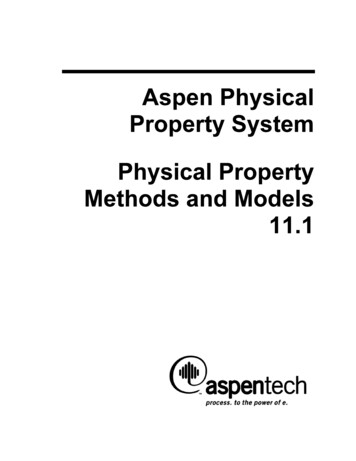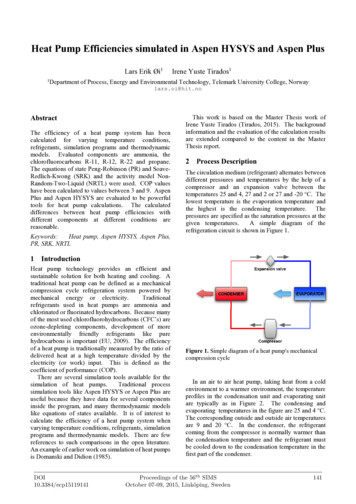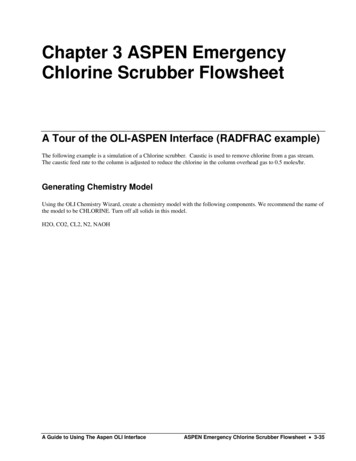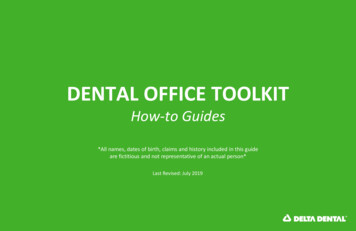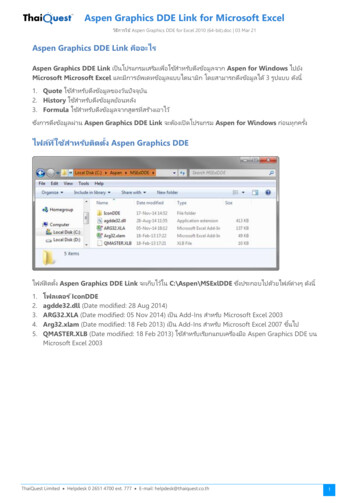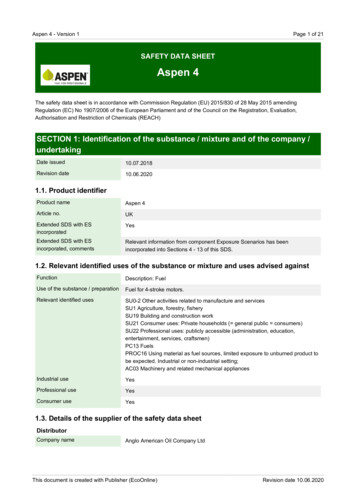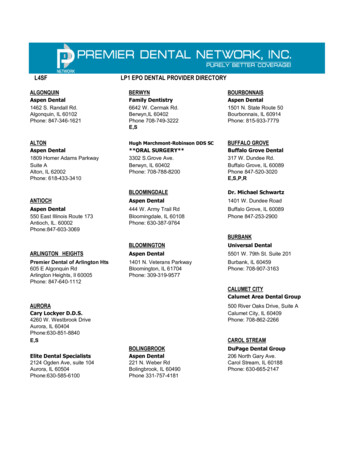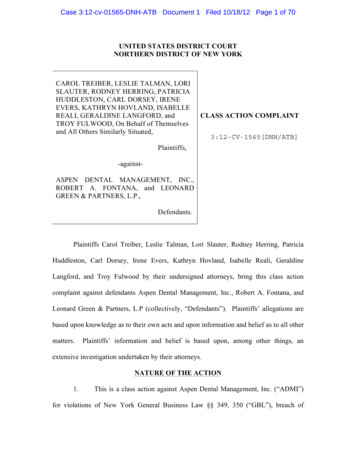
Transcription
Case 3:12-cv-01565-DNH-ATB Document 1 Filed 10/18/12 Page 1 of 70UNITED STATES DISTRICT COURTNORTHERN DISTRICT OF NEW YORKCAROL TREIBER, LESLIE TALMAN, LORISLAUTER, RODNEY HERRING, PATRICIAHUDDLESTON, CARL DORSEY, IRENEEVERS, KATHRYN HOVLAND, ISABELLEREALI, GERALDINE LANGFORD, andTROY FULWOOD, On Behalf of Themselvesand All Others Similarly Situated,CLASS ACTION SPEN DENTAL MANAGEMENT, INC.,ROBERT A. FONTANA, and LEONARDGREEN & PARTNERS, L.P.,Defendants.Plaintiffs Carol Treiber, Leslie Talman, Lori Slauter, Rodney Herring, PatriciaHuddleston, Carl Dorsey, Irene Evers, Kathryn Hovland, Isabelle Reali, GeraldineLangford, and Troy Fulwood by their undersigned attorneys, bring this class actioncomplaint against defendants Aspen Dental Management, Inc., Robert A. Fontana, andLeonard Green & Partners, L.P (collectively, “Defendants”). Plaintiffs’ allegations arebased upon knowledge as to their own acts and upon information and belief as to all othermatters.Plaintiffs’ information and belief is based upon, among other things, anextensive investigation undertaken by their attorneys.NATURE OF THE ACTION1.This is a class action against Aspen Dental Management, Inc. (“ADMI”)for violations of New York General Business Law §§ 349, 350 (“GBL”), breach of
Case 3:12-cv-01565-DNH-ATB Document 1 Filed 10/18/12 Page 2 of 70 implied covenant of good faith and fair dealing, and unjust enrichment. Plaintiffs and themembers of the Classes they seek to represent are all current and former consumers ofdental services and products at ADMI dental clinics who were misled by ADMI’s unfairand deceptive trade practices.2.As alleged herein, through ADMI’s corporate structure and businessmodel, ADMI engages in the unlawful corporate practice of medicine, and in doing so,induces consumers into purchasing dental services and products.3.Plaintiffs, on behalf of themselves and on behalf of a class and subclass ofsimilarly situated individuals, seek to obtain injunctive relief and/or recovercompensatory damages in the amount of all treatments purchased due to ADMI’sunlawful conduct alleged herein.4.In terms of injunctive relief, Plaintiffs seek, inter alia, an order directing:(a) cessation of the wrongful and deceptive practices; (b) implementation ofadministrative changes designed to remedy current and future problems; and (c)improved disclosure to ADMI consumers.JURISDICTION AND VENUE5.This Court has diversity subject-matter jurisdiction over this class actionpursuant to the Class Action Fairness Act of 2005, Pub. L. No. 109-2, 119 Stat. 4(“CAFA”), which, inter alia, amends 28 U.S.C. § 1332, at new subsection (d), conferringfederal jurisdiction over class actions where, as here: (a) there are more that 100 or moremembers in the proposed class and subclass; (b) at least some members of the proposedclass and subclass have a different citizenship from ADMI; and (c) the claims of the 2
Case 3:12-cv-01565-DNH-ATB Document 1 Filed 10/18/12 Page 3 of 70 proposed members of the subclass exceed the sum or value of five million dollars( 5,000,000) in the aggregate. See 29 U.S.C. § 1332(d)(2) and (6).6.This Court has personal jurisdiction over the Plaintiffs because theysubmit to the jurisdiction of this Court.7.This Court has personal jurisdiction over Defendant Aspen DentalManagement, Inc. (“ADMI”) because ADMI is headquartered in the State of New York,transacts business within the State of New York, and by virtue of the fact that ADMI’sexecutive offices are located in the State, ADMI continually and systematically conductsbusiness throughout this State.8.This Court has personal jurisdiction over Defendant Leonard Green &Partners, L.P. (“LGP”) by virtue of its majority ownership of Defendant ADMI, whichtransacts business and maintains its headquarters and executive offices in the State ofNew York.9.This Court has personal jurisdiction over Defendant Robert A. Fontana(“CEO Fontana”) because CEO Fontana resides in the State of New York and is thePresident and Chief Executive Officer of Defendant ADMI, which transacts business andmaintains its headquarters and executive offices in the State of New York.10.Venue is proper because ADMI is headquartered in this District, conductssubstantial business in this District, maintains offices in this District, and because certainof the acts or omissions affecting Plaintiffs and members of the proposed class andsubclass occurred in this District. 3
Case 3:12-cv-01565-DNH-ATB Document 1 Filed 10/18/12 Page 4 of 70 PARTIES11.Plaintiff Carol Treiber (“Treiber”) is an individual residing in Morris, NewYork. In April 2011, Treiber became a patient at an ADMI clinic in New Hartford, NewYork.12.Plaintiff Leslie Talman (“Talman”) is an individual residing in WestHaven, Connecticut. In December 2010, Talman became a patient at an ADMI clinic inOrange, Connecticut.13.Plaintiff Lori Slauter (“Slauter”) is an individual residing in Altoona,Pennsylvania. In June 2010, Slauter became a patient at an ADMI clinic in Altoona,Pennsylvania.14.Plaintiff Rodney Herring (“Herring”) is an individual residing inBourbonnais, Illinois. In September 2010, Herring became a patient at an ADMI clinic inBourbonnais, Illinois.15.Plaintiff Patricia Huddleston (“Huddleston”) is an individual residing inRhodes, Michigan. In August 2010, Huddleston became a patient at an ADMI clinic inBay City, Michigan.16.Plaintiff Carl Dorsey (“Dorsey”) is an individual residing in Swansea,Massachusetts. In April 2011, Dorsey became a patient at an ADMI clinic in Seekonk,Massachusetts.17.Plaintiff Irene Evers (“Evers”) is an individual residing in North Judson,Indiana. In September 2011, Evers became a patient at an ADMI clinic in Valparaiso,Indiana. 4
Case 3:12-cv-01565-DNH-ATB Document 1 Filed 10/18/12 Page 5 of 70 18.Plaintiff Kathryn Hovland (“Hovland”) is an individual residing inMilwaukee, Wisconsin. In March 2011, Hovland became a patient at an ADMI clinic inBrookfield, Wisconsin.19.Plaintiff Isabelle Reali (“Reali”) is an individual residing in SouthPortland, Maine. In July 2010, Reali became a patient at an ADMI clinic in SouthPortland, Maine.20.Plaintiff Geraldine Langford (“Langford”) is an individual residing inPaducah, Kentucky. In December 2010, Langford became a patient at an ADMI clinic inPaducah, Kentucky.21.Plaintiff Troy Fulwood (“Fulwood”) is an individual residing in FortMyers, Florida. In October 2009, Fulwood became a patient at an ADMI clinic in FortMyers – Cypress Woods, Florida.22.Defendant ADMI is a Delaware general business corporation with itsprincipal executive offices located at 281 Sanders Creek Parkway, East Syracuse, NewYork, 13057. It is registered with the New York State Department of State, Division ofCorporations, as a foreign business corporation – DOS ID # 2357912.23.Defendant CEO Fontana is the President and Chief Executive Officer, andthe Chairman of the Board of Directors, of ADMI.24.Defendant LGP is the majority owner of ADMI.a. According to its website, LGP is “one of the nation’s preeminent privateequity firms with over 14 billion of committed capital” that invests “in establishedcompanies that are leaders in their markets.” 5
Case 3:12-cv-01565-DNH-ATB Document 1 Filed 10/18/12 Page 6 of 70 b. LGP’s offices are located at 11111 Santa Monica Boulevard, Los Angeles,California, 90025.c. Three (3) of LGP’s “Firm Professionals” currently serve on ADMI’sBoard of Directors: (i) Managing Partner Peter J. Nolan; (ii) Partner John M. Baumer;and (iii) Principal Alyse M. Wagner.CLASS ACTION ALLEGATIONS25.Plaintiffs bring this action pursuant to Fed. R. Civ. P. 23(a) and 23(b)(2)and (b)(3) on behalf of themselves and the following class and subclass (collectively“Classes” unless specified):(a) All persons who are or may be harmed by ADMI’s illegalcorporate practice of medicine by virtue of being payingrecipients of ADMI dental services and products (the “Class”);and(b) All persons who were harmed by ADMI’s illegal corporatepractice of medicine after paying for ADMI dental servicesand/or products (the “Subclass”).26.The Class Period is defined as the time period applicable under the claimsto be certified.27.Excluded from the Classes are Defendants, their assigns, and successors,legal representatives, and any entity in which Defendants have a controlling interest.28.Plaintiffs reserve the right to revise these class definitions and to addsubclasses as appropriate based on facts learned as the litigation progresses.29.Plaintiffs Carol Treiber, Leslie Talman, Lori Slauter, Rodney Herring,Patricia Huddleston, Carl Dorsey, Irene Evers, Kathryn Hovland, Isabelle Reali,Geraldine Langford, and Troy Fulwood, by virtue of their experiences and damagessuffered as ADMI consumers, are representative of the proposed Classes, comprised of 6
Case 3:12-cv-01565-DNH-ATB Document 1 Filed 10/18/12 Page 7 of 70 all similarly situated individuals who, in their capacity as ADMI consumers entering intotransactions throughout each of the states in which ADMI operates, were subjected to,inter alia, the unlawful corporate practice of medicine causing violations of New YorkGeneral Business Law §§ 349, 350.30.This action is properly maintainable as a class action.31.The Classes are so numerous that joinder of all members is impracticable.32.To the extent required, the number and identity of class members caneasily be determined from the records maintained by ADMI and/or its agents. Thedisposition of their claims in a class action will be of benefit to the parties and to theCourt.33.A class action is superior to other methods for the fair and efficientadjudication of the claims herein asserted, and no unusual difficulties are likely to beencountered in the management of this action as a class action. The likelihood ofindividual class members prosecuting separate claims is remote.34.There is a well-defined community of interest in the questions of law andfact involved affecting Plaintiffs and members of the Classes.35.Among the questions of law and fact which are common to members ofthe Class (i.e., 23(b)(2)) are the following:a. Whether ADMI maintains clinics that are, at all relevant times,fraudulently incorporated and owned, operated, and controlled byDefendants; 7
Case 3:12-cv-01565-DNH-ATB Document 1 Filed 10/18/12 Page 8 of 70 b. Whether ADMI maintains clinics that are, at all relevant times, nominally“owned” by sham owner-dentists who do not engage in the practice ofdentistry through the professional corporations they formed;c. Whether ADMI maintains clinics that are, at all relevant times, engaged inunlawful fee-splitting with non-dentists; andd. Whether ADMI’s illegal corporate practice of medicine has or will causeharm to consumers.36.Among the questions of law and fact which are common to members ofthe Subclass (i.e., 23(b)(3)) are the following:a. Whether ADMI violated GBL §§ 349, 350 by engaging in the unlawfulcorporate practice of medicine;b. Whether ADMI breached common law covenants with Plaintiffs and allothers similarly situated by, inter alia, and engaging in the unlawfulcorporate practice of medicine; andc. Whether, and to what extent, Plaintiffs and members of the Subclass havebeen damaged by ADMI’s misconduct and the proper measure ofdamages.37.Plaintiffs are members of the Classes and are committed to prosecutingthis action. Plaintiffs have retained competent counsel experienced in litigation of thisnature.38.Plaintiffs’ claims are typical of the claims of other members of the Classesin that they are seeking to change ADMI’s corporate practices and/or seekingcompensatory damages for ADMI’s conduct as alleged herein, the same claims being 8
Case 3:12-cv-01565-DNH-ATB Document 1 Filed 10/18/12 Page 9 of 70 asserted on behalf of each individual class member. Plaintiffs are, therefore, adequaterepresentatives of the Classes as described herein.39.The likelihood of individual class members prosecuting separateindividual actions is remote due to the relatively small loss suffered by each classmember as compared to the burden and expense of prosecuting litigation of this natureand magnitude.Absent a class action, ADMI is likely to avoid liability for itswrongdoing, and the members of the Classes are unlikely to obtain redress for the wrongsalleged herein.40.Adjudication of this case on a class-wide basis is manageable by thisCourt. The contracts that were entered into by Plaintiffs and each class member are thesame or so similar as to be legally and factually indistinguishable in all material respects.As a result, it will not be difficult for a jury to determine whether ADMI committed theviolations alleged herein. This court is an appropriate forum for this dispute.FACTUAL ALLEGATIONS RELEVANT TO ALL CLAIMS41.As described above, ADMI holds itself out as a dental service corporationproviding integrated business support services to dental care providers throughout theUnited States.42.In the State of New York, ADMI maintains its corporate headquarters, aPractice Support Center, 41 dental clinics, and a denture manufacturing facility.43.As of the date of this filing, ADMI maintains 358 dental clinicsthroughout the United States, with locations in 22 states: Arizona (7), Connecticut (17),Florida (28), Illinois (16), Indiana (29), Iowa (15), Kentucky (9), Maine (7),Massachusetts (27), Michigan (18), Nebraska (4), New Hampshire (9), New York (41), 9
Case 3:12-cv-01565-DNH-ATB Document 1 Filed 10/18/12 Page 10 of 70 Ohio (42), Oregon (6), Pennsylvania (36), Rhode Island (3), South Carolina (7),Tennessee (14), Vermont (1), Washington (4), and Wisconsin (18).144.According to ADMI, in 2011, ADMI practices recorded more than 2.2million patient visits, including visits from more that 490,000 new patients.45.ADMI purports to “allow[] dentists to focus on providing great clinicalcare to their patients, with the support of a team of experts who offer back-end businessand administrative support,” including “training and professional development, benefitsadministration, marketing and advertising, insurance processing, procurement, facilitiesand equipment.” According to ADMI, “[f]or the dentist, joining Aspen Dental meansthat he or she no longer has to wear multiple hats – serving as HR director, ITprofessional, payroll clerk, benefits administrator and accountant, to name a few – butrather can focus on patient care and leading their office team.”46.According to CEO Fontana, who is not a dentist and has no background indentistry, “the business services [ADMI] offer[s] dentists enable[s] them to focus onpatient care and relieve them from the everyday business requirements of the practice.”47.ADMI is the “800-pound gorilla” in an industry known as “CorporateDentistry” – an emerging business model in which a corporation runs the business side ofa practice and hires licensed dentists as employees and independent contractors. Thismodel tends to attract young and inexperienced dentists fresh out of dental school,particularly ones with exorbitant student loans who are baited into joining ADMI bylucrative compensation packages, which include production-based incentive bonuses;they are new to the practice of dentistry and not familiar with the corporate practicestructure. 1 Aspen Dental, Find a Location, available at http://www.aspendental.com/locations.10
Case 3:12-cv-01565-DNH-ATB Document 1 Filed 10/18/12 Page 11 of 70 48.On the patient side, ADMI’s target market has been described by CEOFontana as consisting of patients who “do not have a regular pattern of dental care andsometimes have gone years without visiting the dentist.” According to CEO Fontana:“Ultimately, [our] growth is driven by the fact that Aspen Dental practicesmeet a significant unmet need in the marketplace . While we seepatients from all economic walks of life, our focus is to help the increasingnumber of families struggling to make ends meet. These families aremaking tough financial choices every day or living paycheck to paycheckand to them, dental care can become somewhat discretionary or ‘nice-tohave’ as opposed to ‘must have.’”49.CEO Fontana has also stated: “[I]n communities with an aging population,access to dental care can be a true challenge.Because Aspen-served practices areconveniently located, work with most private insurance plans, are open all weekdays andselect evenings and Saturdays, and charge affordable fees, they are an attractive optionfor patients.”50.Not surprisingly, ADMI places its Local Offices primarily in low-incomeareas and targets blue-collar workers and unwitting consumers who are unfamiliar withproper dental care. ADMI’s business model has forced many consumers into debt andhas led to complaints of, inter alia, patients being overcharged and billed for dentalservices and/or products that they did not receive and/or authorize.A.A Brief History of ADMI and the Influence of Private Equity51.“Private Equity,” as defined by Investopedia.com, “consists of investorsand funds that make investments directly into private companies . Capital for privateequity is raised from retail and institutional investors, and can be used to fund newtechnologies, expand working capital within an owned company, make acqusitions, or tostrengthen a balance sheet.” As further explained: “Many private equity firms conduct 11
Case 3:12-cv-01565-DNH-ATB Document 1 Filed 10/18/12 Page 12 of 70 what are known as leveraged buyouts (LBOs), where large amounts of debt are issued tofund a large purchase. Private equity firms will then try to improve the financial resultsand prospects of the company in the hope of reselling the company to another firm orcashing out via an IPO.”252.In 1964, Upstate Dental began providing dental laboratory services to theSyracuse, New York community. In 1981, Upstate Dental merged its laboratory serviceswith centralized management services to create a new dental practice managementconcept.53.In 1997, a group led by APG Partners private equity investor AndyGraham (“Graham”) formed Upstate Dental Management, LLC and acquired the assets ofUpstate Family Denture Services, Inc., Upstate Denture Labs, Inc., and East Coast DentalManagement, Inc.The entities were then merged and re-named “Aspen DentalManagement, Inc.,” offering dental practice management services to various dentaloffices in the northeast.54.On its website, APG Partners describes its investment in ADMI asfollows:ThesisThe founder of Upstate Dental had created an unusual business model,combining practice management with in-house lab services, focused onserving “non-compliant” patients. APG perceived the business model asunique and addressing an unmet need. By upgrading and scaling theoperations, APG believed the company had the opportunity to become thedominant dental service provider in its region.OutcomeBy 2006, Aspen Dental was considered one of the largest and mostsuccessful dental practice management businesses in the country. The 2 See asp#axzz23j7m20Si.12
Case 3:12-cv-01565-DNH-ATB Document 1 Filed 10/18/12 Page 13 of 70 company had developed a high quality leadership team, a proven modelfor providing valuable practice management services and a comprehensiveset of unique long-term incentive programs. Executing a steady growthstrategy, the company’s value grew appreciably over an eight-year period.In 2006, the company was sold to Ares Management.55.Graham is currently the CEO of private investment firm IntrepidInvestment Partners LLC (“Intrepid”). According to the Intrepid website, Graham “hasover 25 years of diversified experience in the financial services industry, including 20years as a private-equity investor.” Prior to Intrepid, Graham was the founder of APG,Managing Director of Barrington Associates, founder of the Merchant BankingDepartment of Tucker, Anthony, Managing Director of Cariad Capital, Inc., and VicePresident of Narragansett Capital. Graham has an M.B.A. and, in addition to ADMI, hasalso served as a director of the Oregon Ice Cream Company, Glasstech, andComsec/Narragansett Security.56.According to a testimonial by ADMI CEO Robert A. Fontana, Graham,who is not a dentist and has no medical or dental background whatsoever:was a major shareholder of Aspen and served as Chairman for nine years.During this time, Aspen experienced significant growth and change.[Graham] was an active partner in all major decisions, helping toestablish many of the foundations of the Company’s growth strategy,and was a valuable contributor to our long term success.57.During Graham’s tenure, ADMI grew rapidly. In 1999, ADMI expandedto 25 locations. In 2000, ADMI expanded to 33 locations. In 2001, ADMI expanded to37 locations, opened its central processing facility in Syracuse, and branded itsproprietary line of full and partial dentures – Comfidents. In 2002, ADMI expanded to41 locations, including its first in New Hampshire. In 2003, ADMI expanded to 50locations, including its first in Pennsylvania. 13
Case 3:12-cv-01565-DNH-ATB Document 1 Filed 10/18/12 Page 14 of 70 58.In February 2004, Capital Resources Partners (“CRP”), which describesitself as “an experienced provider of debt and equity capital to lower middle marketcompanies” that “manages in excess of 1.1 billion across five funds,” invested 18.7million in ADMI, in the form of both senior and junior secured subordinated notes with awarrant for common stock, which was used to complete a recapitalization of ADMI’sthen-existing investors and to provide capital for the opening of new offices.59.In 2004, ADMI expanded to 62 locations, and in 2005, ADMI expanded to80 locations, with its first locations in Greater Pittsburgh and Ohio. In June 2006, ADMIwas acquired by private equity firm Ares Management LLC (“Ares”) in a leveragedbuyout. That year, ADMI expanded to 100 locations, with its first in Indiana andArizona. In 2007, ADMI opened 35 new practices, expanding to 135 locations, includingits first in Michigan and in 2008, ADMI added 47 new locations and purportedly servedits millionth patient.60.In 2010, ADMI practices recorded more than 1.8 million patient visits,including visits from more than 422,000 new patients. For the 12 months ending on June30, 2010, ADMI recorded roughly 50 million of earnings before interest, taxes,depreciation, and amortization (“EBITDA”) and 350 million in revenue.61.In or around August 2010, defendant LGP, a Los Angeles, California–based private equity firm, acquired a controlling stake in ADMI at auction for 547.5million. LGP contributed approximately 250 million of the common equity, and Aresand senior management rolled over approximately 117 million of equity.a. According to its website, LGP is “one of the nation’s preeminent privateequity firms with over 14 billion of committed capital” that invests “in established 14
Case 3:12-cv-01565-DNH-ATB Document 1 Filed 10/18/12 Page 15 of 70 companies that are leaders in their markets.” LGP’s “investment philosophy is to targetcash flow positive businesses that have the ability to grow by at least 50% over a fiveyear period.”Moreover, according to LGP: “We rely heavily on our managementpartners to execute the operational and strategic business plan for the companies that weinvest in.”b. Peter J. Nolan, an LGP Managing Partner, currently serves on ADMI’sBoard of Directors. He is not a dentist and has no background in dentistry. In additionto ADMI, Nolan also serves on the Board of Directors of The Palms Hotel and Casinoand Motorsport Aftermarket Group, a family of brands in the motorsport industry.c. John M. Baumer, an LGP Partner, currently serves on ADMI’s Board ofDirectors. He is not a dentist and has no background in dentistry. In addition to ADMI,Baumer also serves on the Board of Directors of Equinox Fitness health clubs, Leslie’sPoolmart, Inc., a retailer of pool supplies, Petco Animal Supplies, Inc., a retailer of petproducts, and drugstore chain Rite Aid Corporation.d. Alyse M. Wagner, an LGP Principal, currently serves on ADMI’s Boardof Directors. She is not a dentist and has no background in dentistry. In addition toADMI, Wagner also serves on the Board of Directors of AerSale Holdings, Inc., asupplier of aftermarket flight equipment to the aviation industry, and Animal HealthInternational, a “premier food and companion animal health distributor offering cattle,equine, poultry, swine, cat, and dog animal health products and supplies.”62.According to the American College of Dentists, a dentist “practices alearned profession, i.e., one who has special knowledge and skills used to benefit thepublic, regardless of personal gain.” A dentist’s “chief motive [is] to benefit mankind, 15
Case 3:12-cv-01565-DNH-ATB Document 1 Filed 10/18/12 Page 16 of 70 with the dentist’s financial rewards secondary [T]he level of financial gain to thedentist must never be a consideration in any of the dentist’s professionalrecommendations.”363.The dental industry is attractive to private equity firms because it is not asregulated as other aspects of healthcare. An August 26, 2010 article in Dentistry Todayreporting on LGP’s bid for ADMI states:This kind of sale is unique in the dental profession because most dentistswork either by themselves or with one other dentist. It would be newground for private-equity firms because they have not been involved indentistry as much as other aspects of healthcare.These firms think this is a good move now because there is still money tobe made for them in the dental profession. Many parts of dental care arecovered by insurance, with the exception being cosmetic and oral surgery.Dentists have not been as affected as doctors by the reforms in healthcare.The move may not be good for the dentists who work in these chains,however, because the firms will try to maximize their profits. This meansthat the dentists may be working longer hours, something that could becounterproductive because it may come at the expense of good dentalcare. [Emphasis added].64.On September 1, 2010, ADMI CEO Fontana stated in a press release that“private equity has been part of the business since our inception more than a decade ago . As with all private equity transactions, there comes a time when the private equitygroup seeks to exit its investment and a new private equity partnership is formed. This isa normal part of the private equity-backed growth cycle.”65.In 2011, ADMI practices recorded more than 2.2 million patient visits,including visits from more than 490,000 new patients. 3See Ethics Handbook for Dentists, American College of Dentists, at http://www.acd.org/ethicshandbook. 16
Case 3:12-cv-01565-DNH-ATB Document 1 Filed 10/18/12 Page 17 of 70 66.In or around February 2012, ADMI announced that it would pay a 127million dividend to shareholders, including LGP. In order to fund the 127 millondividend, ADMI increased the size of its term loan from 195 million to 320 million andboosted a revolving credit facility from 35 million to 50 million. The term loan wasarranged by, inter alia, GE Capital Markets, the lending unit of General Electric Co.67.GE Capital Markets also owns and controls CareCredit, a healthcare creditcard that serves as primary provider of patient payment plans and financing of expensesthat are not covered by dental insurance or when treatment exceeds coverage.68.According to Standard & Poor’s Ratings Services, “[t]he transactions willboost [ADMI’s] already-high financial leverage, but we believe EBITDA will grow at alow-double-digit annual rate over the next few years, helping Aspen to service its heavydebt burden.”B.ADMI’s Corporate Structure and Business Model69.ADMI’s principal executive offices are located at a 45,000-square-footPractice Support Center (“PSC”) in Syracuse, New York. From these offices, ADMI andits board of directors and senior management, including CEO Fontana, set all companywide operational policies and procedures, and operates, directs, controls, and manages theLocal Offices.70.The PSC has 350 employees, and includes a state-of-the-art, nationwidepatient scheduling center. Staffed by more than 60 employees, the call center handlesmore than 70,000 calls monthly and schedules approximately 35,000 new patients amonth for Local Offices throughout the country. 17
Case 3:12-cv-01565-DNH-ATB Document 1 Filed 10/18/12 Page 18 of 70 71.The PSC houses all technology support functions for all of the LocalOffices nationwide, provides the systems and software programs utilized by all of theLocal Offices, and acts as the national epicenter for all ADMI advertising and marketing,which is originated at the PSC, published and made available to all consumers nationwidevia ADMI’s website, and disseminated to all Local Offices.72.The PSC serves as ADMI’s centralized denture laboratory. According toADMI’s website, ADMI’s “Central Denture Lab” is “[o]ne of the largest denture labfacilities in the country,” and it “produced more than 140,000 full and partialComfiDents brand dentures” in 2011 for ADMI’s Local Offices throughout the country.73.ADMI has total control over, and responsibility for, the accounting,finance, and billing and collections for all Local Offices nationwide. ADMI manages theCompany’s nationwide payroll through the PSC.All ADMI employees, whetherworking at the PSC or a Local Office, are paid through ADMI’s central offices.74.AMDI handles accounts payables and receivables, as well as paymentplans such as CareCredit, at the PSC for all Local Offices nationwide.75.ADMI handles and controls the purchasing of each Local Office’s assets,equipment, materials, and supplies through the PSC.76.ADMI performs all human resource functions – including, inter alia,recruiting, interviewing, and hiring all dentists, hygieni
dental services and products at ADMI dental clinics who were misled by ADMI's unfair and deceptive trade practices. 2. As alleged herein, through ADMI's corporate structure and business model, ADMI engages in the unlawful corporate practice of medicine, and in doing so, induces consumers into purchasing dental services and products. 3.
